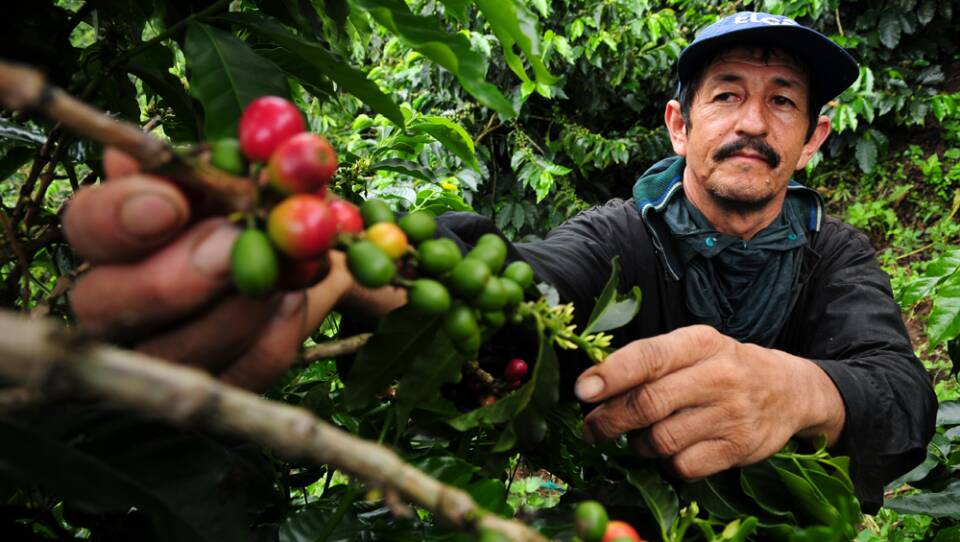ARI SHAPIRO, HOST:
The cost of coffee is soaring to levels not seen in decades, at lesat on the futures market. That’s after droughts and abnormal weather in coffee-growing countries. So what does that mean for us coffee drinkers? NPR’s Alina Selyukh reports.
ALINA SELYUKH, BYLINE: Almost every day, Brian Phillips gets messages from his friends in Brazil who are coffee farmers.
BRIAN PHILLIPS: They send me, like, pictures of their rain gauges - how much it rained, how much it didn’t rain.
SELYUKH: I called Phillips in Kansas City, Missouri, where he works at Anthem Coffee Imports. It brings in raw coffee beans from about two dozen countries, and the biggest one is Brazil.
PHILLIPS: Literally, as we’re on the phone, my friend Sergio texted me, hey, when do you have time for a call? We have to talk about next year.
SELYUKH: That’s because Brazil’s coffee harvest is coming in short - by as much as a quarter, by one assessment. Earlier this year, farmers there faced one of the worst droughts on record. By the time rain fell - belatedly - many coffee trees were too weak to produce any fruit. John Cossette is a longtime importer with Royal Coffee in California.
JOHN COSSETTE: They had determined, you know, so much of the drought damage was irreversible, and that’s going to affect next year’s crop pretty significantly.
SELYUKH: The reason this is a big deal is because Brazil is by far the biggest grower of the most popular coffee bean. And this was the second wave of bad news for coffee after problems in Vietnam, the top grower of the other most popular coffee bean - a drought followed by heavier-than-usual rains. Scientists say climate change is shifting weather patterns in these regions.
(SOUNDBITE OF COFFEE BEANS POURING)
SELYUKH: And these two beans - you know them. They keep the world caffeinated. Brazil’s bean is called arabica. It has a milder taste. It goes in your ground and roast coffee.
(SOUNDBITE OF COFFEE GRINDER WHIRRING)
SELYUKH: Vietnam’s bean is called robusta. It tastes edgier, more bitter, and it often goes in your instant coffee.
(SOUNDBITE OF COFFEE JAR BEING OPENED)
SELYUKH: Over the past year, the cost of arabica has jumped around 70%. Robusta has doubled in price. The market is partially fueled by financial speculators just trying to make a buck on the chaos. All this has many roasters and coffee shop owners assessing how to raise their prices without scaring away customers. Meanwhile, big brands like Maxwell House, Folgers and Nescafe have already been hiking supermarket prices, saying shoppers so far seem undeterred.
PHILLIPS: People forget that coffee is a drug - a legal drug (laughter).
SELYUKH: Coffee importer Brian Phillips again.
PHILLIPS: The coffee consumption is not slowing down by any means.
SELYUKH: In fact, there’s a new factor in play. People are now drinking a lot of coffee in countries where they did not use to. China is a huge one, but also the very countries that produce coffee, including Brazil. Here’s Cossette.
COSSETTE: They’re all drinking a lot more coffee, and they’re drinking their own coffee that they’re growing. So there’s going to be less available coffee to export, and that’s going to make it more expensive as well.
SELYUKH: Phillips shared how, 10 years ago, his friends in Brazil couldn’t sell a bag of specialty coffee inside the country. And now, that bag fetches more in cash in Brazil than it would in a complicated export deal with a U.S. company. He and Cossette both take the long view. They point out that, by historic standards, when adjusted for inflation, raw coffee prices are nowhere near the record, but the market has changed.
COSSETTE: To me, the days of cheap coffee are gone forever - over a long time ago.
SELYUKH: Cossette thinks the current price will come down somewhat. And he keeps his cool, knowing that people need their coffee.
(SOUNDBITE OF COFFEE BEING POURED AND STIRRED)
SELYUKH: Alina Selyukh, NPR News.
(SOUNDBITE OF GOVI’S “ESPRESSO”) Transcript provided by NPR, Copyright NPR.





